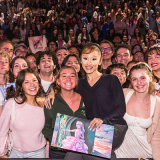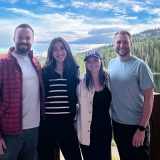From Cinematography to Screen Acting Alumni Spotlight: Kelley Mack
October 21, 2021

Kelley Mack ’14, photo taken by Amanda Edwards
Share your career path with us, how did you decide to transition from your academic focus in cinematography to working as an actress post-graduation?
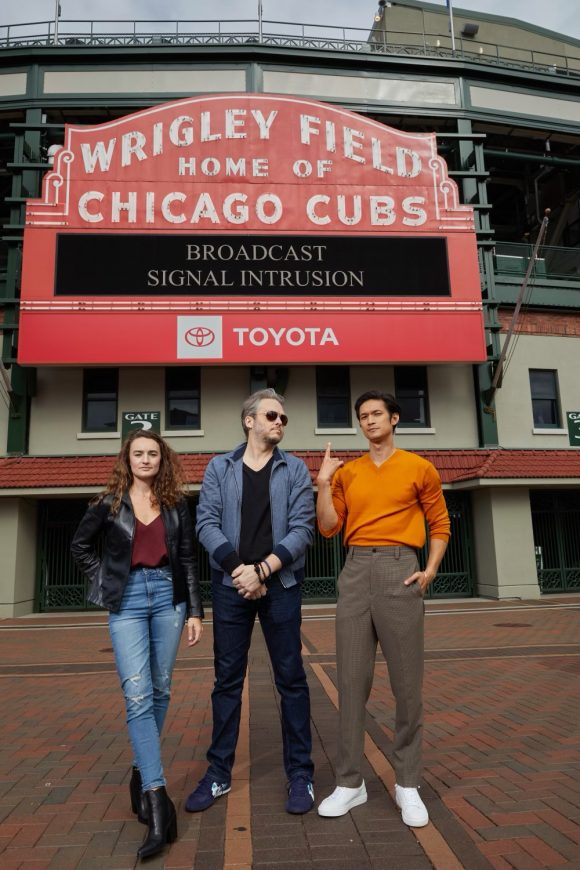
Kelley Mack and her Broadcast Signal Intrusion colleagues, photo taken by Jeff Schear
Heading into college, I knew I enjoyed playing around with my mini HD video camera as well as acting (I had done a few short films before and during high school). I had no clue what my future was going to look like and never saw myself going into a specific career – I just knew I wanted to be in entertainment – so I felt a little confused about what to focus on academically, like most people. I remember being under the impression that if I chose to major in Screen Acting, I would have less access to Film Production classes at Chapman. Because I am all about trying things and making choices through process of elimination, I knew there were so many more opportunities for learning if I majored in Film Production and become exposed to all the different roles on set I didn’t yet know anything about. After graduating with an emphasis in Cinematography, I realized that while I enjoyed many different crew positions, my passion lied in acting. I believe the biggest fear I had with acting, even though I knew it came somewhat naturally to me, was making a fool of myself (I used to be extremely shy). I’ve found that once you step out of your comfort zone, what you’re meant to do becomes more obvious and eventually just feels right. Chapman really forces you to work on set after set, work closely with others, and take creative risks, and I know that was a huge factor in helping me face my fears and be less self conscious & self critical. It was also helpful to have a younger brother (Parker Mack) who was already living in LA and seeing success as an actor, so that inspired me to believe I might be able to do the same. It was after graduation and moving to LA when I took my first real acting class, and it confirmed my suspicion that this was what I was meant to do.
Were there any specific resources (i.e., certain professors, courses, workshops, career advising, etc.) at Chapman that contributed to your career journey post-graduation?
Yes, the late Harry Ufland was a wonderful professor of mine for a semester, and he exposed me to the world of talent agency internships. At the end of my senior year, I was able to experience how a large talent agency operates, and I met some fellow interns there with whom I still have relationships. He also hosted a series of intimate dinners with entertainment professionals, and those were extremely insightful and helped me to hone what I really wanted to do post-graduation. If you have the chance, definitely do as many internships as you possibly can – they provide invaluable real-life experience, even if they’re ultimately informing you about what you don’t want to pursue after graduation. In addition, Kiku Terasaki taught a fantastic class on producing, which was vital in making me feel more prepared to create my own content shortly after college, at a time when many new actors realize that that’s one great way to build up an acting reel/portfolio. Two of the short films I produced, edited and acted in contributed directly to gaining auditions, making industry connections, and experiencing film festivals as a filmmaker. I am also loving the Chapman Masterclasses that have come about recently – they’ve been a wonderful opportunity to take notes and learn from the greats.
What is your advice to students exploring industries outside of their chosen academic discipline?
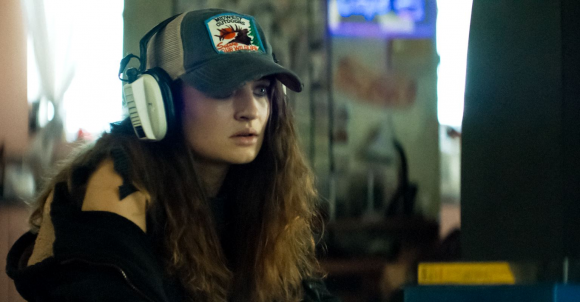
Kelley Mack in Dark Sky Film’s Broadcast Signal Intrusion
Go for it! Why not? I believe that any knowledge you have can inform how you approach a new discipline or interest. There is no shame in changing directions and nothing is really stopping you from doing so. I know that even though I love acting (and producing) now and don’t have any plans to shift my focus, I very well may in the future, and that’s okay with me. Who knows? I think as long you follow your gut and be fearless in regards to trying new things and putting yourself out there, you will only grow as a person. Just dedicate yourself to hard work, and be professional and kind. Even though I studied behind the camera, it only helped me for my work in front of the camera. And I honestly do feel more prepared than other actors on set sometimes because I know how to adjust my performance for a certain lens, frame, camera move, or lighting setup. Producing my own content is also such a joy because knowing what solid editing or sound design or production design looks like means I can bring a talented crew together to create something I’m proud of and communicate with them without feeling lost or uninformed.
A big congratulations on the SXSW premiere and theatrical release of your film Broadcast Signal Intrusion! For our Screen Acting students, what was the process like for you to audition and prepare for this role? Any helpful advice on how to navigate both?
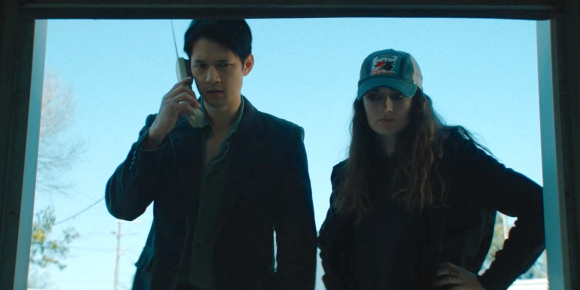
Harry Shum Jr. and Kelley Mack in Dark Sky Film’s Broadcast Signal Intrusion
Thank you! So many auditions are done via self tape now, so that was what happened in this case. I taped myself for the role of Alice after receiving an audition request from my Midwest agent, DDO Chicago. I remember the character breakdown (the short description of the character given to the actors by the casting director) was much longer than most, which are typically a few sentences. The description was a lengthy paragraph, and I absolutely loved that because it gave me so much insight into this person’s backstory, hopes and dreams, day-to-day life, etc. If you aren’t given a long description, writing one yourself can be very helpful in informing your character choices throughout a scene. I had almost a week to prepare my tape, and I was working on the show 9-1-1 at the time. Because I had two long shooting days with substantial down time (my part was a tiny co-star), I was lucky to be given hours upon hours of undistracted time, which I utilized for this prep. I even asked some other actors that I was hanging out with that day for advice on certain parts because the character of Alice was so complicated.
Because it is so easy to be distracted nowadays, I’d say that it’s vital to schedule several hours (at least) to work on your audition sides before you audition/tape. I actually just had an interview where they asked what I think was the key to booking this role, and I said the extra time I took to really study this character, completely memorize the lines (3 scenes, 9 pages total), be specific about my physicality, and drop into the scene when I filmed all contributed to my embodiment of Alice early on – and my co-star who watched my tape agreed.
Once I was offered the role, I asked the director questions that arose for me while reading the full script, got more specific about Alice’s backstory, listened to a lot of the music she would listen to (80s punk), read the scenes over and over again to discover new details, and did a great deal of research about things I had less knowledge of (for example, she’s a drifter, so I watched some documentaries on the homeless population). When I found out I booked the role, I only had about 3 days to prep before filming began, so it was a very quick process – being disciplined with your time and focus is crucial. I have a very detailed and full calendar!
Any parting thoughts or insights?
Dodge College gave me a fantastic education in filmmaking (and the access to sound stages and equipment as early as freshman year was priceless). Because every film/TV set is a team effort, it’s important to understand what others’ roles in pre-production, production and post-production are so you can be an effective contributing team member. I didn’t study Screen Acting in college, which is what I do for a living now, and I don’t necessarily feel like I missed out. Regardless of what your major is at Chapman, if you pursue a career in the filmmaking/entertainment industry, you will be able to utilize that knowledge and then educate yourself in the areas you may not have studied formally for the rest of your life!
Even if an opportunity to do a certain job scares you, say yes. Volunteer yourself to take on responsibilities you aren’t 100% confident in yet, because you never will be. I remember many times at Chapman when I wanted to crawl into a corner and not wake up early on the weekend to get to set, but when I forced myself to do so, I always learned something. And isn’t life just an endless education?
Regarding acting – they say that if you can picture yourself doing anything else, perhaps acting isn’t for you. It’s overused, but I think for good reason. (And keep in mind that I think you can only really determine this a few years after wholeheartedly pursuing it). I haven’t actually worked on a set as an actress in a year and a half, but I still love it and put everything I have into the auditions I am grateful to get. There is more rejection than you can imagine, but it becomes increasingly more normal and eventually doesn’t feel like a direct rejection of you – because it’s not. Not booking a paying acting job becomes easier to handle and the joy comes from the work and process rather than the result.
Be sure to catch Kelley’s new film Broadcast Signal Intrusion in theaters and on digital platforms this October 22nd!

